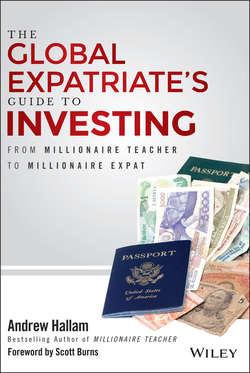Читать книгу The Global Expatriate's Guide to Investing - Hallam Andrew - Страница 8
На сайте Литреса книга снята с продажи.
Chapter 1
Setting Your Bull's-Eye
ОглавлениеWhen I first started investing, I wanted to retire at 40. I was 19 years old and saving like a lunatic. I won't confess the screwy things I did to pinch pennies. Instead, I want to share what I did right: the part you'll find helpful. I planned how much money I wanted to save, and why. Such planning, even more than the hyperactive saving, made my life a heck of a lot easier.
In 2014, shortly after my 44th birthday, my wife and I retired from our Singapore-based teaching jobs. That doesn't mean we live like trust-funded hedonists. Nor does it mean we'll never work again. It does mean, however, that our private parts aren't sitting in somebody else's vise. A few years back, if our boss had gone on a firing spree, sacking skinny bald guys and bilingual blondes, we would have been fine. We had enough money to survive without working.
When you're financially free, you might choose to keep working, take a long-term leave, or retire. Financial freedom provides options.
If you're not financially free today, set a target.
Begin with the following question:
If you were retired today, how much do you think you would spend each year?
For now, ignore inflation. Everything from a back wax to cornflakes will cost more in the future. But we'll make adjustments for that later. Just consider how much you would need annually if you retired today. It's silly to suggest a specific number of dollars needed by every retiree. If you're retiring in London, England, for example, costs will be higher than in Chiang Mai, Thailand.
Big spenders also require more. Five-star holiday junkies have pricier tastes than those who reserve luxury for special occasions. Some experts suggest you should budget retirement expenses totaling 70 to 80 percent of your working household income. But such cookie-cutter solutions make little sense. Even among those in the same income bracket, some people consume like gas-guzzling Mack trucks; others sip like a Smart car. Your future expenses depend on your personal needs, wants, and chosen retirement location.
To estimate future costs of living, figure out what you're spending right now. Record every penny you spend for at least six months. It's easy to do with an app on your phone, or with a pencil and notebook. Then make adjustments for predicted retirement lifestyle changes. Without a job, you won't be maintaining a professional wardrobe. Nor will you be saving for your kids’ college or your retirement. Do you plan to be somewhere cheaper or more expensive than where you currently live? In either case, make adjustments. Costs of living in the world's major cities are available at www.numbeo.com.
This isn't about keeping up with Mr. and Mrs. Jones. But if you want to know how much the typical (non-expat) retired household spends, here's a peek.
According to the University of Michigan's Health and Retirement Study, total costs for the typical American retired household were $31,365 in 2012.7
Canadian Business magazine reported that on average a Canadian retiree spent $39,400 (Canadian dollars) in 2009.8
MGM Advantage estimates that British retirement expenses averaged £23,107 per year in 2013.9
Australian households, according to the ASFA Retirement Standard Benchmark, need $32,603 (Australian dollars) for a “modest” retirement.10
Your needs depend on you: your lifestyle, your retirement location, and your financial obligations. Unfortunately, those afflicted by expatitis crave more than the average Dick or Jane.
7
“Growing Older in America,” University of Michigan Health and Retirement Study. Accessed April 30, 2014. http://hrsonline.isr.umich.edu/sitedocs/brochure/HRS-brochure.pdf.
8
“How Much Do You Need to Retire Well?” Canadian Business. Accessed April 30, 2014. www.canadianbusiness.com/investing/how-much-do-you-need-to-retire-well/.
9
“Couples Must Budget £600,000 for Retirement,” The Telegraph, April 26, 2010. Accessed April 30, 2014. www.telegraph.co.uk/finance/personalfinance/7635532/Couples-must-budget-600000-for-retirement.html.
10
“Resources,” ASFA Retirement Standard. Accessed April 30, 2014. www.superannuation.asn.au/resources/retirement-standard.
